CCOP IS THE LONGEST SERVING VOLUNTEER COMMUNITY SAFETY PATROL IN SAN FRANCISCO
Castro Community On Patrol 2006 – to date
Castro Community On Patrol (CCOP) was built on the foundation and history laid by all of those who went before us, adapting to the changing needs of the community and the socio-political landscape. Formed in 2006 in response to violent physical assaults against Gay men in the Castro neighborhood, CCOP forged partnerships with local law enforcement agencies, businesses, and other community organizations. These collaborations were instrumental in enhancing the effectiveness of our safety patrols and addressing broader issues such as establishing a Business Watch Program, encouraging the installation of surveillance cameras, distributing FREE safety whistles, developing numerous safety posters and efforts, delivering self-defense training and active shooter training, and liaising with local, State, and Federal government entities to raise LGBTQ+ community safety concerns.
The resilience and adaptability of CCOP has led to it being one of the most long-lasting, effective, and recognized safety programs within the LGBTQ+ Castro community. Looking forward, the LGBTQ+ community in the Castro and beyond must continue to advocate for inclusive policies, social acceptance, and safety for all. The legacy of safety patrols serves as a reminder that the fight for LGBTQ+ rights extend beyond legal victories and requires ongoing community engagement. As the struggle for LGBTQ+ rights continue, the lessons learned from the history of safety patrols in the Castro can inform future initiatives, fostering a sense of community, pride, and activism. Through collaboration, visibility, and ongoing advocacy, LGBTQ+ safety patrols remain a crucial component of the broader movement for equality and acceptance.
Some key community historical moments CCOP has been present for include:
- 2024 CCOP recognized by FBI, City & County of San Francisco , SFDA, SFSD, SFPD for our work in Active Shooter training to the community
- 2023 Drag superstar Heklina memorial and performance
- 2022 Club-Q Murders community response and rally
- 2021 Queers Against Asian Hate rally and march
- 2020 COVID-19 Pandemic response assisting the Department of Public Health
- 2018 March For Our Lives demonstration and march
- 2017 Patriot Prayer response planning and liaison with FBI, SFPD and city Supervisors
- 2016 Pulse Nightclub Murders community response and rally (organized within 24 hours of the mass shooting.)
- 2015 US Supreme Court Same Sex Marriage decision rallies
- 2013 Proposition 8 demonstrations and rallies
- 2009 Rally for LGBT Rights
- 2008 California Proposition 8 rallies and marches
CCOP is a vital element in the overall fabric of safety in the Castro neighborhood. Volunteers are drawn from all neighborhoods, all walks of life, and all genders and sexual orientations. Anyone of 18 years of age or older with no criminal convictions or charges pending for theft or violence is encouraged to join our volunteer Patroller ranks.
In 2024 CCOP established as an independent 501(c)(3) nonprofit corporation with the I.R.S. and the State of California. No longer restricted to just offering services to the Castro and Duboce Triangle neighborhoods, a limitation placed on us by our former fiscal sponsoring organization, CCOP now offers our vast knowledge, information, resources, connections, training opportunities, and support to neighborhoods and communities throughout San Francisco and beyond as appropriate.
San Francisco Street Patrol 1990-1994
As the LGBTQ+ community continued to evolve, so did the strategies employed by safety patrol groups. In the 1990s, the San Francisco Street Patrol (SFSP) was formed. Initially called DORIS SQUASH (Defend Our Rights In the Streets / Super Queers United Against Savage Heterosexism) the group was active from 1990 to 1994. Its mission was to promote GLBT people’s safety by primarily discouraging queer bashing through organized and regular nighttime patrols of the Castro. SFSP also worked to increase awareness of self-defense and violence avoidance methods. This was the first group to hand out whistles and fliers with safety tips. The group drifted apart in 1994 as members moved out of the Bay Area for various reasons.
Richard Heakin Memorial Butterfly Brigade 1976-1981
The Bay Area Gay Liberation (BAGL) group was active in handing out safety whistles in the Castro neighborhood as a safety initiative and in 1976 they formed the Richard Heakin Memorial Butterfly Brigade in memory of a young man murdered in Tucson, Arizona by a group of four teenagers in 1976. The Butterfly Brigade later became the San Francisco Street Patrol.
Pink Berets 1975-1979
The Pink Berets, a groundbreaking LGBTQ+ safety patrol group, was formed in response to rising violence against queer individuals in the Castro during the late 1970s. Comprising volunteers from the community, the Pink Berets aimed to create a visible and assertive presence to deter potential attackers and provide support to those in need. The early days of the Pink Berets were not without challenges. The group faced opposition from some segments of society, including law enforcement and conservative groups. Despite these hurdles, the Pink Berets persevered, gaining recognition for their commitment to community safety. The group’s successes included a reduction in hate crimes, increased visibility of LGBTQ+ individuals, and fostering a sense of unity within the community. As a symbol of resistance, the Pink Berets left an indelible mark on the history of LGBTQ+ activism in San Francisco. The Pink Berets were functional for around five years before ultimately disbanding.
Lavender Panthers 1973-1974
The Lavender Panthers was an armed patrol group which was founded by Pentecostal Evangelical preacher and activist Raymond Broshears. The group formed in direct response to violent assaults and verbal hatred levied against the LGBTQ+ community and patrolled in the Castro and Tenderloin neighborhoods. Adopting both aggressive and peaceful strategies, the Lavender Panthers first distributed safety whistles, a concept borrowed from the Feminist movement. Patrol members carried bats and shotguns, and a violent altercation outside of the Pendulum Bar in Castro led to Police being called and the ultimate disbandment of the group in 1974. Despite the similarity in names between the Black Panthers and the Lavender Panthers, the groups were not connected.
A Brief History Of The Castro And San Francisco
The Castro neighborhood in San Francisco has long been a symbol of LGBTQ+ pride and activism since the 1960’s. As a haven for the queer community, it has played a pivotal role in the struggle for LGBTQ+ rights and acceptance. San Francisco was always known as a libertine city with regard to sexual freedom and pleasures. The infamous “Barbary Coast” waterfront brought sailors, visitors, and those seeking alternative lifestyles together far from the restrictive “social acceptance” in many other cities at that time. The 20th Century Gold Rush served to significantly increase this openness and saw brothels, topless bars, strip clubs, and alternative lifestyles thrive in the ever growing city.
During World War I the U.S. Navy discharged “known homosexuals” in port cities, leading to many forming the first gay communities as they banded together for support in the 1920’s and 1930’s. World War II saw many soldiers, sailors, and air force personnel embark to the Asian theater through the ports of Oakland and San Francisco, but before shipping out many had the opportunity to savor the unrestricted delights of San Francisco. At the conclusion of World War II, many of these same service members were demobilized from active duty in camps around the San Francisco and Bay Area, and many thousands of them chose to remain in the more liberal and accepting environment rather than returning “home” to wherever they had originated. Added to this, many thousands were dishonorably discharged from active service when discovered as “known homosexuals” again, and were processed out of the Military in San Francisco, with many of them choosing to stay in the city to create a new life. This spawned the creation and success of many alternative lifestyle establishments and businesses, including Mona’s, the first lesbian bar opened in 1934, the Black Cat Café, famous for it’s Sunday afternoon gay drag review which always played to a packed house and many more.
Between 1942 and 1943 the Military Police and San Francisco Police conducted raids on gay bars under the pretext of protecting servicemen from homosexuals. One raid on the Rickshaw gay bar in Chinatown led to two lesbians fighting back in 1943, triggering a small riot which predated the more famous Stonewall riot by decades. During the 1950’s the beat culture added to the alternative lifestyle and sexual openness of the city in general with more and more gay bars and clubs opening in the North Beach and Tenderloin neighborhoods.
As with all progress and advancement that pushes cultural “norms” the alternative lifestyle gay community suffered a backlash and significant repression at the hands of the San Francisco Police Department and the Alcohol Board of Control (ABC) in the late 50’s and early 60’s leading to raids and arrests. The Police frequently invited the press to attend the raids, so the names, places of employment, and pictures of Gay men primarily arrested during the raids were printed in local newspapers, often leading to the loss of employment. This repression led directly to the establishment of the Tavern Guild to fight back, organizing predominantly gay owned businesses.
On January 1, 1965 one of the most infamous incidents occurred at the California Hall New Years Eve fundraising dance hosted by a number of gay and lesbian organizations and supported by local supportive clergy from many denominations. San Francisco Police Department had agreed not to intervene before the event, but reneged on this promise, surrounding the hall and taking photographs of everyone entering. When four lawyers attending the ball complained, they were promptly arrested, resulting in a media furor as the clergy and public opinion was shifting away from draconian prejudice. This led to the four having the charged dropped and the first ever Police Department Gay Liaison Officer in the country position being created. In 1966, just one year later, Police Officers entered the Gene Compton’s Cafe in the Tenderloin to “roust” the sex workers and gay and lesbian patrons, as occurred frequently, however on this evening the crowd fought back led by some lesbian patrons and a riot ensued lasting for two days. The Stonewall riots in New York took place two years later in 1969, sparking a worldwide fight for gay and lesbian rights, freedoms, and equality.
The 1960’s were a tumultuous time with the “white flight” from many downtown neighborhoods to the suburbs as automobiles became more affordable, better road systems, and the growth and appeal of suburban life drew many families away from the city. The Castro, which was formerly known as “Eureka Valley,” had been predominantly a Catholic Irish settled neighborhood centered on Most Holy Redeemer Church on Diamond Street. As the counter culture blossoming in the Haight Ashbury just over the hill started to creep ever closer to Eureka Valley, and as many residents were not investing in the upkeep of their homes, many moved out of the area which then saw an influx of predominantly gay men and couples seeking the more affordable housing. As the number of gay men rose in the Castro, the concept of a gay neighborhood took root and over time the housing was improved and updated and gay men opened businesses. One unique aspect of this vibrant neighborhood’s history is the development and evolution of LGBTQ+ volunteer safety patrols, aimed at ensuring the safety and well-being of community members.
To understand the emergence of LGBTQ+ safety patrols, it is crucial to delve into the historical context of the Castro neighborhood. In the late 1960s and early 1970s, the LGBTQ+ community was beginning to assert its rights and demand recognition. The Stonewall riots of 1969 marked a turning point, igniting a wave of activism that reverberated across the United States. The Castro emerged as a hub for LGBTQ+ activism, drawing individuals seeking a safe haven from discrimination and persecution. As the community thrived, so did the need for ensuring the safety of its members in the face of harassment, violence, and prejudice.
KEEPING THE COMMUNITY
SAFE SINCE 2006
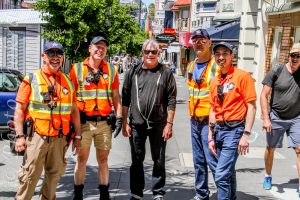
We deliver several KEY programs to help improve and enhance the “fabric of safety” for the neighborhood including:
- COPS – Community On Patrol Service program which trains, certifies, and deploys volunteers on regular neighborhood patrols, much like a normal neighborhood watch but with “boots on the ground” walking and interacting with residents, employees, and visitors.
- CRESt – Community Response, Engagement, and Support program which brings emergent community volunteers together with our trained Patrollers to assist other community groups and organizations with their special events, rally’s, marches and so on. Through this program our Patrollers also engage directly in the management of other community benefit efforts such as the Castro Cares program, Castro Merchants, Stop The Violence program, etc.
- CET – Community Education and Training program which develops training classes and outreach materials on a number of safety topics which are open to all. This program includes our Community Self-Defense classes and our Active Shooter classes which are extremely popular.
- CAR – Community Alert and Response program which encourages, develops, and supports the creation of Neighborhood Watch and Business Watch programs, including training and guidance on how to identify suspicious activity and effectively report it to other neighbors and businesses as well as law enforcement.
We also work diligently to share relevant information and concerns, ensuring the appropriate people, groups, and entities are involved in finding suitable long-term solutions.
WE NEED YOU!
Castro Patrol is built on, supported by, and relies on UNPAID VOLUNTEER support.
We do our best, with the limited resources we currently have available, but we could do SO MUCH MORE if we are able to increase our volunteer Patroller numbers. PLEASE CONSIDER VOLUNTEERING with us, to help the community and improve the overall safety of the neighborhood.
- Patrolling is FUN and extremely rewarding,
- We provide full training and supply the patrol equipment needed,
- Patrolling is great exercise, and you get to know the Castro neighborhood in an entirely new way,
- ANYONE of 18 years or older is eligible (provided you can walk for 3-hours and have no recent criminal convictions),
- People you’ve never met before will thank you for volunteering,
- We only ask for a minimum of one, 3-hour patrol each month (but you’re welcome to do more,)
- You will have the opportunity to take part in LGBTQ+ history,
- You will have FREE access to all of our community training classes and more besides,
- You will learn much more about how our systems of law enforcement and government works,
- You will literally become a community HERO.
TRY US OUT – you never know. You may just love Patrolling as much as we do! If you don’t, Patrolling is “at will” so you can always leave if it is not for you, but if you don’t try it first, how will you ever know?

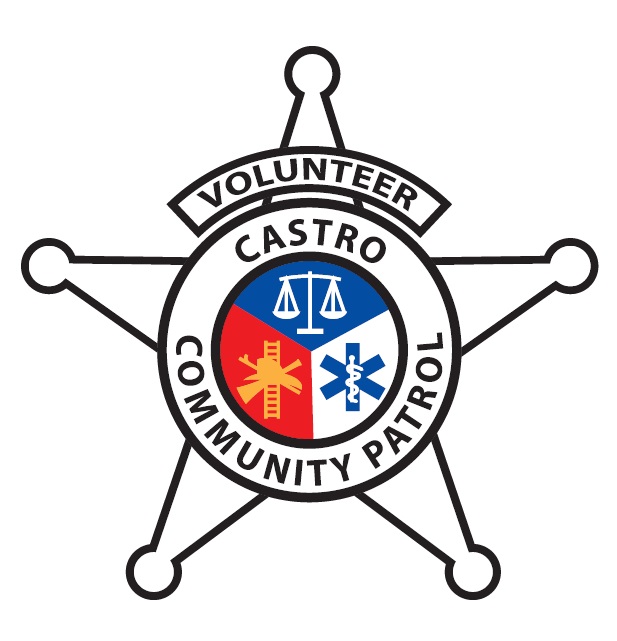
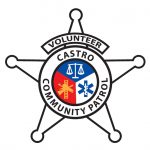
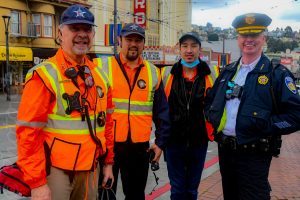
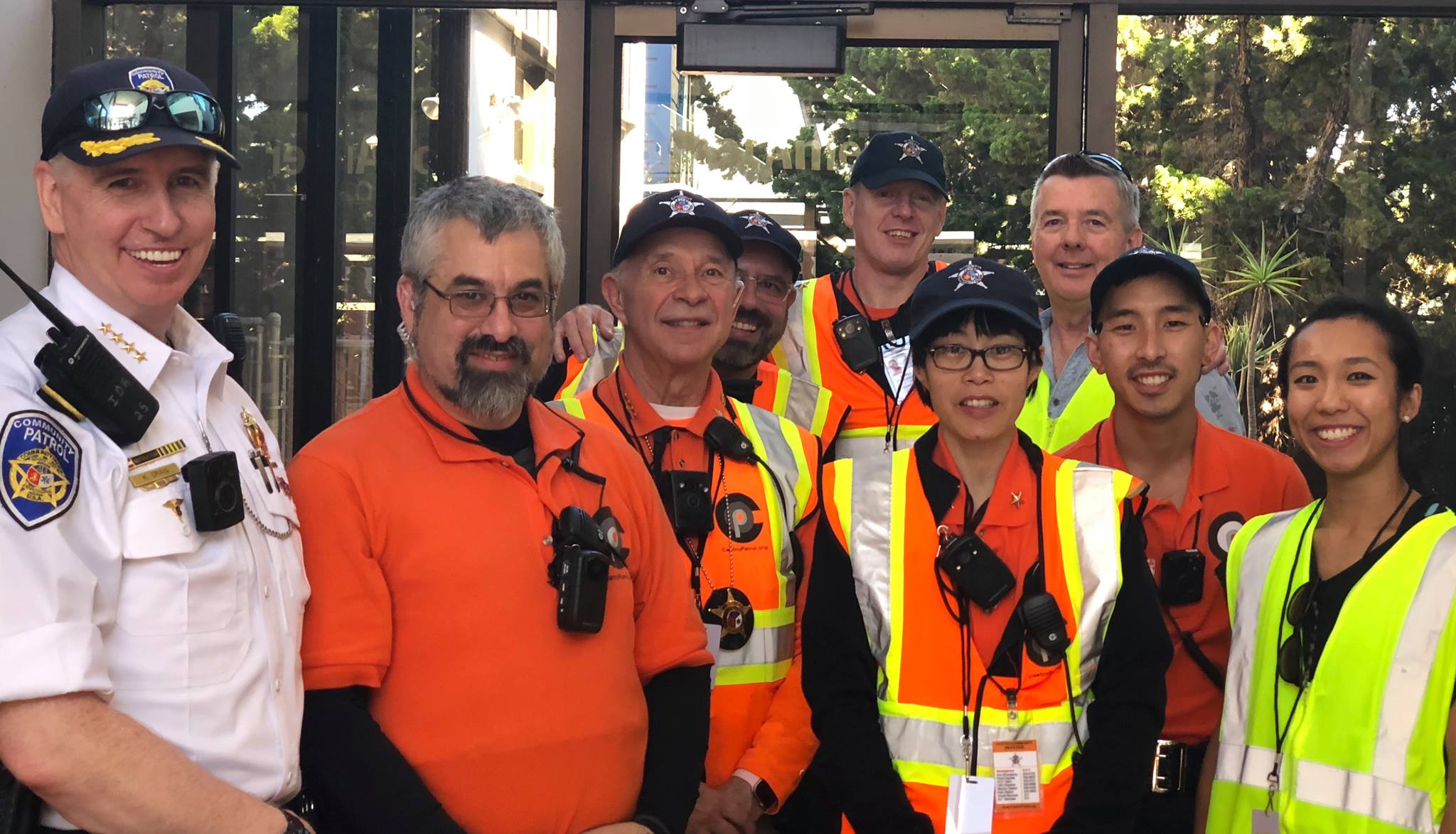 .
.